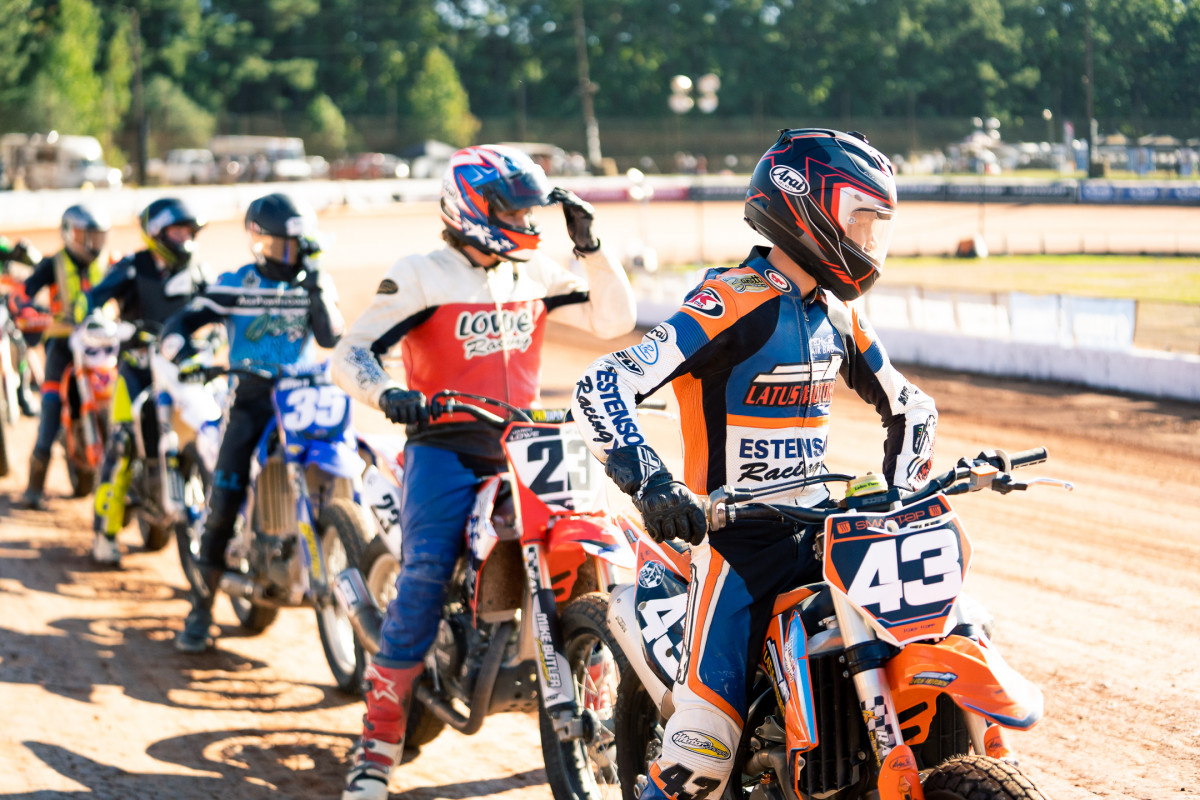
The Road to AFT: Paving a Pathway for Future Flat Trackers
Last Friday night in Atlanta, 17-year-old phenom Dallas Daniels continued to grow his legend, winning out in stunning fashion over a motivated Morgen Mischler in the evening’s AFT Singles Main.
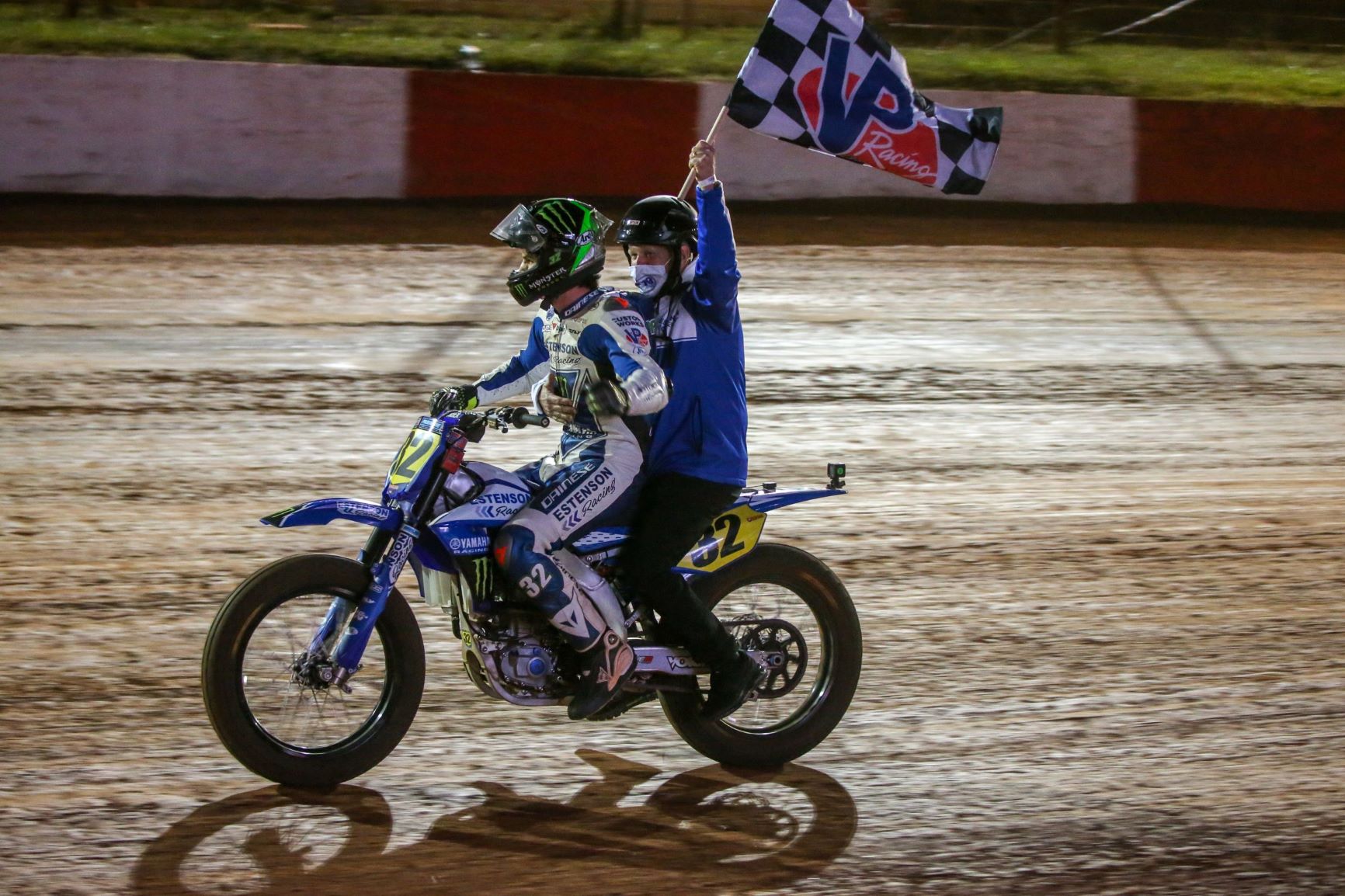
Daniels takes yet another victory lap on a tremendous season at the Atlanta Short Track I.
Photo: Scott Hunter, American Flat Track
Daniels continued his domination of a class long renowned for its parity and unpredictability. In a category where even the most commanding title runs typically boast just four or five wins over 18 rounds, the Illinois native has already racked up seven victories in just 12 attempts this season, with the last five coming in succession.
The AFT Singles field has simply had no answer to his ascension, while the elite of the elite in the AFT SuperTwins class are starting to look over their shoulders. Daniels was recently identified by none other than Jared Mees as one of the two up-and-coming riders he views as a serious threat in the not too distant future.
But perhaps the answer is out there... it just isn’t in the paddock, at least not yet. Or more accurately, until now.
The night before and about an hour away at Senoia Raceway, a handful of the most talented amateur dirt trackers in the country earned the right to compete in front of the pro paddock on Friday in an exhibition race debut of the newly launched Road to AFT initiative.
That exhibition turned out to be one of the most entertaining contests in a night packed with highlights as uber prospects Kody Kopp and Chase Saathoff squared off in close quarters battle. Ultimately, Kopp -- the son of 2000 GNC Joe Kopp and the second of the two future stars identified by Mees -- shook free for the win.
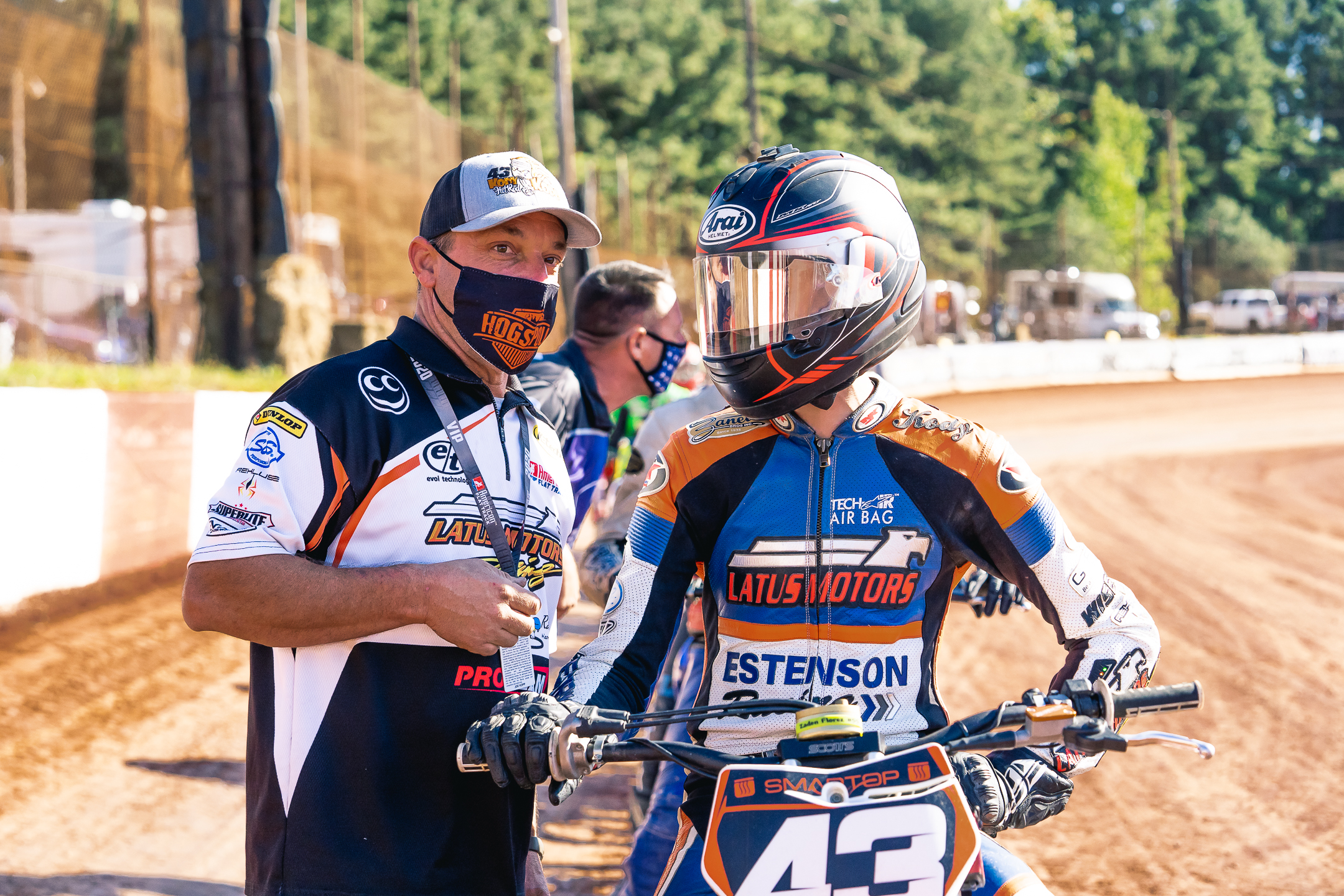
Kody Kopp and father/former Grand National Champion Joe Kopp discuss lines and strategy.
Photo: Kristen Lassen, American Flat Track

Kopp and Saathoof displaying talent and finesse out on the racetrack.
Photo: Kristen Lassen, American Flat Track
Due to his ability and pedigree, Kopp is the rare talent with the same sort of advance hype Daniels received prior to his entrance to the pro ranks. But only rarely do amateurs enjoy that level of recognition and have the professional backing to help make for a seamless transition.
That said, the sport is fortunate to have a wealth of gifted riders in the development stage these days -- a trend that only expects to expand as dirt track is increasingly regarded as the career destination rather than a stepping stone to another discipline. Not surprisingly, some of the most promising young racers on two wheels (and their parents) have taken notice as multi-time national champion roadracers JD Beach, James Rispoli, and Danny Eslick are among the legions of racers who have elected to return home to flat track.
The Progressive AFT paddock has always been loaded with former AMA amateur national champions. But the substantial jump in professionalism experienced by the series in recent years has also meant that it's never been more difficult to negotiate the tricky transition from the amateur to the pro ranks.
Something had to be done so that Progressive AFT could reap the benefits of its own success and tap into that talent explosion rather than unintentionally wall it off.
“Historically, flat track has been a grassroots sport with a very thin professional veneer on top, which is a bit different to Supercross or roadracing,” said AFT CEO Michael Lock. “And, there's always been this romantic idea that because the pro world and the amateur worlds were so closely linked that little Johnny and his dad could go to the Springfield Mile and beat Scott Parker or beat Jared Mees.
“It's a lovely romantic idea, and I dare say, 30 years ago, that may have happened on occasion, but the pro game now has been raised so dramatically in the last few years.
“Now we not only have two or three stars of the sport, we have a whole pro paddock. We've progressively limited access to AFT entry to riders who specialize in the sport. As recently as three years ago, I think if you had raced at all in the previous two seasons you could apply for a hardcard the following season. That kind of horrified me. The pace and the intensity are really much higher now.
“What that has inevitably done is cut down on entries. So we now have fewer entries but of a higher standard. That will continue. But the question is, how do we prime the pump for the stars of tomorrow?
“What AFT was really missing was a continuous unbroken line between youth and amateur and pro. How do you possibly transition from being a youth or amateur into the pro game, rather than just trial and error? The problem with error is it's usually painful.”
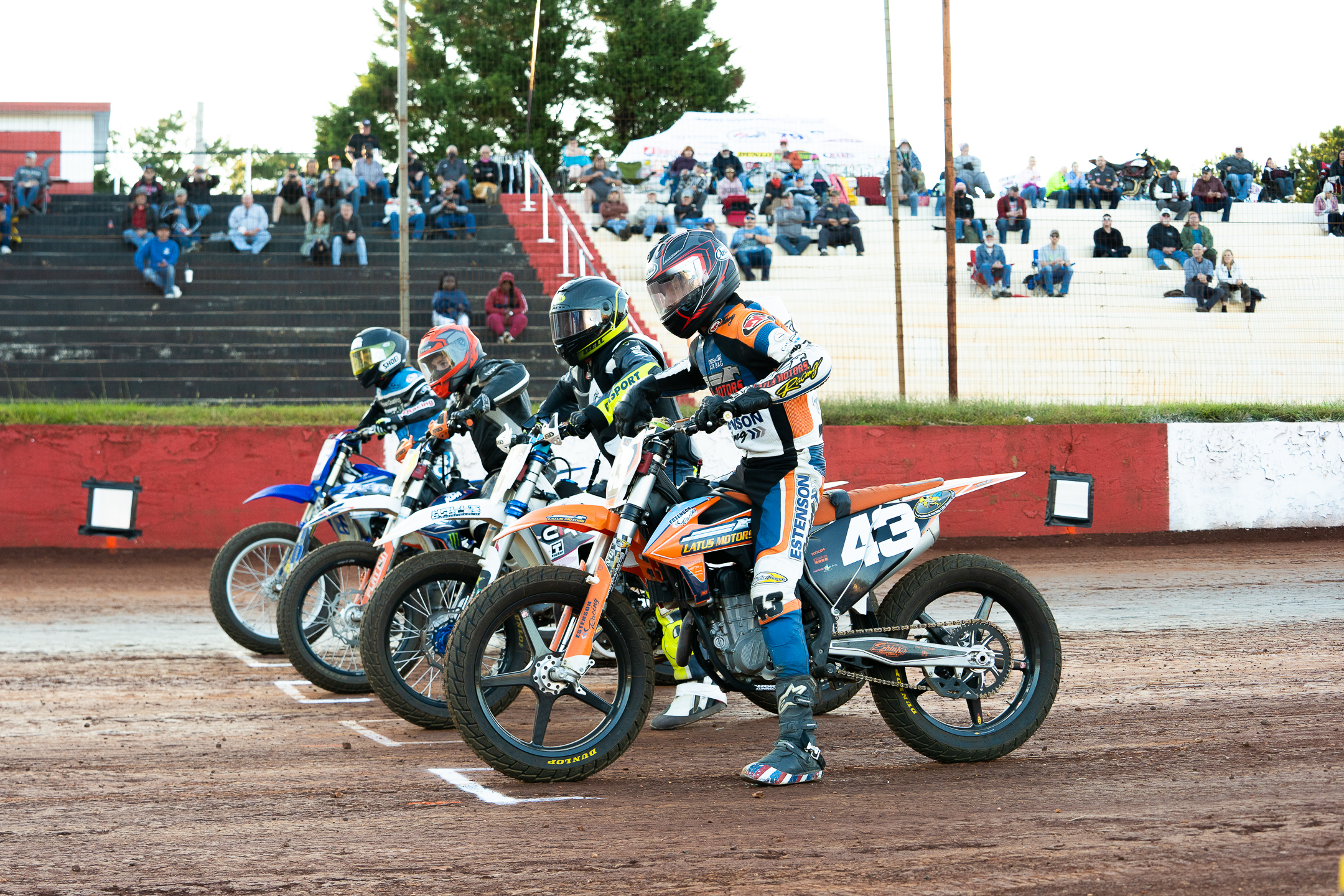
The Road to AFT Invitational starting lineup at the 2020 Atlanta Short Track.
Photo: Kristen Lassen, American Flat Track
The issue has been considered of strategic importance among Progressive AFT brass for some time. Recognizing a need for an official and more formalized developmental pathway program along the lines of AMA Supercross’ Supercross Futures or Indy Car’s Road to Indy, the plan to introduce the Road to AFT program was hatched.
Lock explained, “We've been looking at this, really, for about five years now. We're not inventing the wheel here, lots of series have a version of a progression; we're trying to get with the program. Because AFT has grown so dramatically, so quickly, we have to provide this bridge between the amateur and the pro world rather than simply letting market forces take it on.
“We tried to get this off the ground in 2017 and 2018, but for a variety of reasons we just weren't able to do it. We finally came to an agreement with the AMA on this last year. And it was important to do this with the AMA as they are the sanctioning body for all youth and amateur sport. I felt this needed to be a partnership rather than a standalone initiative.
“We were just about to announce this earlier this year until the world collapsed.”
Simply assembling a new season schedule for Progressive AFT post-COVID-19 was a Herculean task on its own. As a result, the initial hope to feature a series of Road to AFT races alongside it fell by the wayside and the program was put on hold.
But rather than let it slip all the way into 2021 (or beyond), rider development guru Rob “Robby Bobby” McLendon stepped forward with an idea to use an amateur event he was promoting the night before the Atlanta Short Track in nearby Senoia, Georgia, as its official coming out party.
And hence, the Road to AFT is at last a reality.
Even though it now officially exists, some may still be unclear on what exactly its aims are and how it hopes to achieve them. In short, it's intended to increase awareness and do so in two directions -- helping insiders look out and outsiders look in.
Regarding the former, Road to AFT will better educate the paddock about the sport’s brightest young prospects.
“Road to AFT has what I would say to be realistic short-term milestones,” Lock said. “We want to give some visibility to the kids who are coming up or are potential talents, so that not only the series officials can have an eye on them, but also teams and manufacturers who are looking for the next great talent.
“Not every amateur is as visible as Dallas Daniels,” Lock said. “Everybody was telling me from the time he was eleven years of age he was great, but not everybody has that level of visibility.
“Part of this was to have some kind of criteria for scoring -- how they do in those Road to AFT races. That way we can have something empirical rather than just word of mouth. No longer will it have to be the local promoter in Iowa ringing our chief of competition saying you have to get this kid in AFT. And that is where it was before. The scoring can also conform to a criteria to give us more confidence when it comes to granting pro licenses.”
Of course, results sheets alone are not sufficient for proper talent scouting.
Lock continued, “That's why it's important to be able to do these races at an AFT event where it will be possible (to get actual eyes on). The data can tell you which kid is on the podium, but only watching the races tells you which kids have got racecraft and exceptional talent, even if they have holes in that talent or in their experience at this moment in time.
“To have experienced guys from my team like Steve Moorehead able to watch these kids and see how they progress and talk to them when they are off the track and to talk to their parents -- that non-empirical part of the process is almost as important as the actual results.”
That doesn’t mean, however, the Road to AFT will be limited exclusively to Progressive AFT events. The program also intends to capitalize on preexisting amateur series such as Steve Nace’s All Stars in order to best fulfill its mission and potential.
Lock explained, “We've been talking potentially with Steve Nace for about four years on this program so far. A lot of the knowledge I've gained has come through the wisdom of Steve, who's obviously been deep into this side of the sport for decades.
“My anticipation is we would like to come to an agreement long term with well-run amateur series like Steve's whereby there could be a regular Road to AFT card in the event as well as ones we’ll be doing directly at AFT events.
“They don't have to all have to be at championship events. I could see there being a Road to AFT class within a series like Steve Nace's All Stars and that can run independently of anything we're doing. We can have staff on site to supervise what's going on there.”
Equally important to providing the paddock a look into the future is providing the future a look into the paddock.
“The bar has been set high,” Lock said. “At the moment, I would just like to redress that a little bit by getting some visibility not only from us to them but also visibility for these kids into the bright spotlight of the AFT series before they turn up fresh faced at DAYTONA on their 16th birthday.
”We found that it's not only an enormous jump up to the pro game on the track, it’s actually an enormous jump off the track as well in terms of how you carry yourself, what your presentation looks like, how you do your paperwork, how you start using publicity and social media channels to drive revenue and visibility.”
For Rob McLendon, this aspect of the program is absolutely vital and something that sorely been missing for decades.
He explained, “I started as an amateur myself way back when. In 2002, I turned pro, went to my first race in Savanna, Georgia, and literally embarrassed myself. I didn't know what to do or where to go. Up until it was time to throw the green flag, I was clueless. For so long, racers have basically been just thrown to the wolves in the pro ranks.
“The theory behind this is first to identify talented amateurs who are going pro in the near future, and then give them a chance to earn a place into this spotlight at an AFT event. That way, they can learn the ins and outs before they get to the pro level. They’ll know how to go through tech, how to do their transponders, and all that stuff.”
McLendon knows of what he speaks; as of late, he’s helped aid the progression of the likes of 2019 AFT Singles champion Dalton Gauthier, second year pro and 2020 AFT Singles race winner Brandon Kitchen and 2019 Nicky Hayden AMA Flat Track Horizon Award winner and 2020 rookie AFT Singles race winner Trevor Brunner.
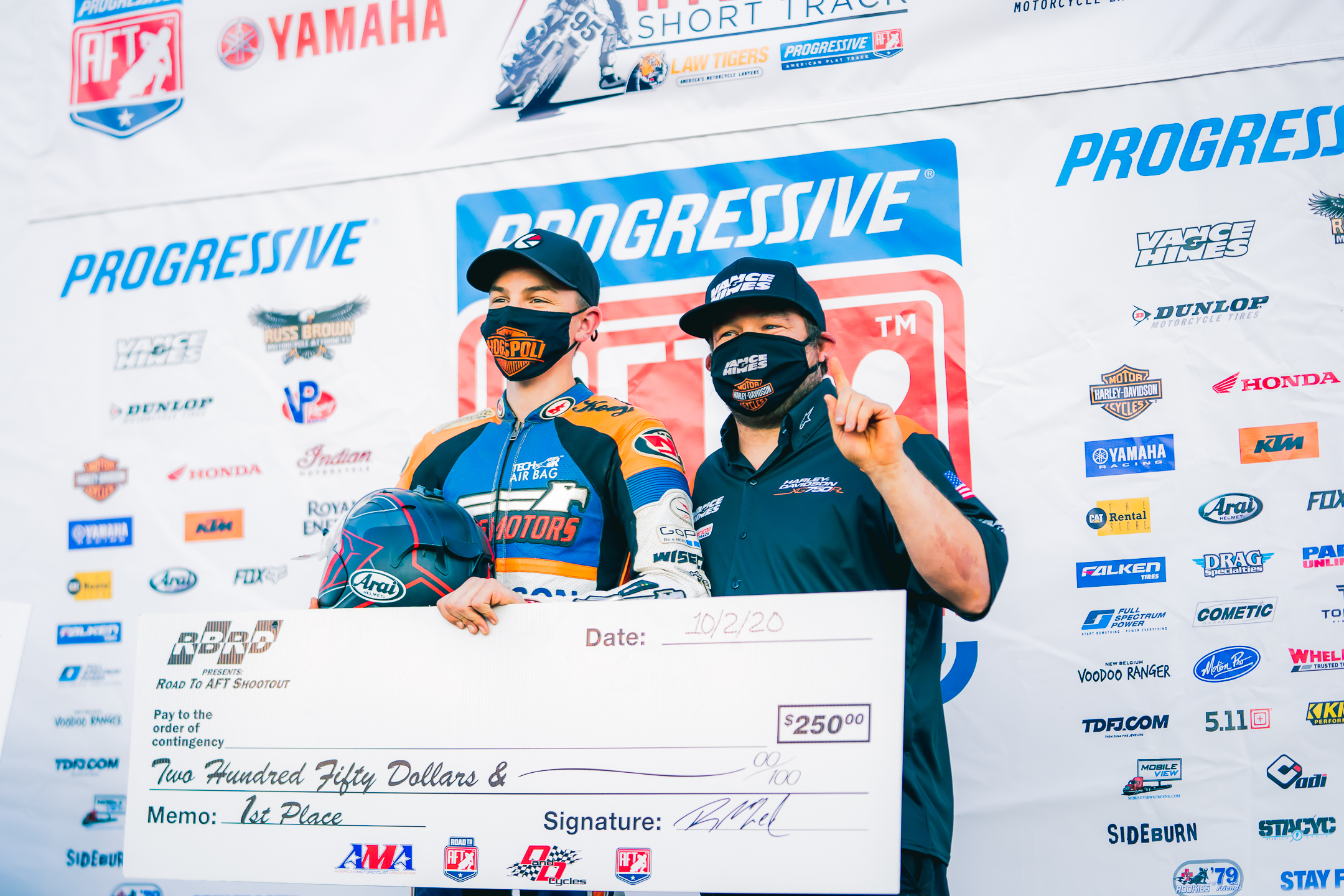
McLendon proudly poses with one of his Road to AFT proteges.
Photo: Kristen Lassen, American Flat Track
McLendon sees the need to take some of the services he provides his riders and apply them at scale.
“I'm only one person,” he said. “Not that I'm anything special by any means, but I've got a good sense to make my way around the AFT circuit... Whereas a pro guy usually has their own team or mechanic, these amateurs are, for the most part, just kids traveling with their dads.
“It’s important that they have some sort of guidance throughout the whole event. Not just, ‘All right, welcome to AFT, don't talk to me anymore’. But, ‘Hey, welcome to AFT, here is where you need to start -- you go through tech, make sure you've got your credentials right, make sure your bike's prepared.’ That way, they're not just thrown to the wolves.”
Only officially announced a week ago and with just a maiden exhibition race under its belt, the Road to AFT is quickly garnering glowing reviews from its intended audience.
After finishing second to Kopp in the Road to AFT Main, Saathoof said, “It was a really cool learning experience to be out in front of the pro teams, and riding out there under the lights in front of AFT fans. Watching the pros go and then try to follow their lines was really fun.
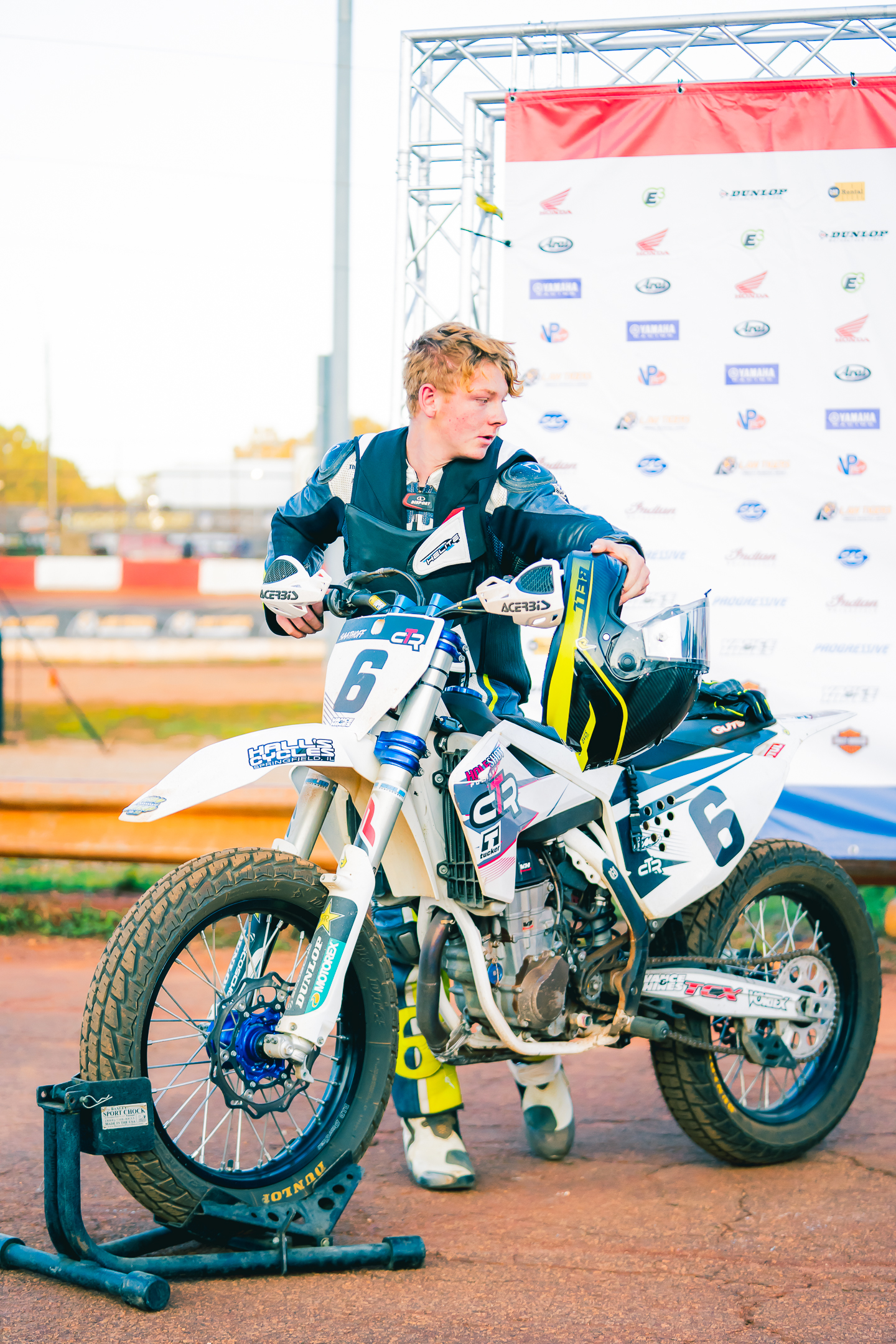
Saathoof positioning his machine in the Progressive AFT Victory Lane.
Photo: Kristen Lassen, American Flat Track
“This will most definitely be helpful to young amateurs coming up and getting close to the pro ranks, especially compared with just riding amateur until you go pro and then your first pro season you have no idea what to do.”
Kopp concurred: “The Road to AFT is a great experience for up-and-coming amateurs. It’s great that the big teams get a chance to watch you and you get to put your name out there before you go to the big leagues. I can’t thank AFT enough for making this happen.”
Latest news

Evan Renshaw Takes the Reins for Moto Anatomy X Royal Enfield






























